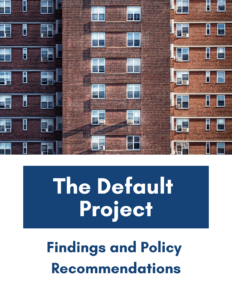

The Default Project: A Survey of the Reasons for Tenant Defaults in Housing Court Eviction Cases
Massachusetts Law Reform Institute (MLRI) and the Justice Center of Southeast Massachusetts (JCSEM) have released an innovative report analyzing the high rate of eviction cases where tenants default, or do not appear, at a court hearing. Statewide, tenants are defaulted in nearly 25% of eviction cases, with often disastrous results. The Massachusetts Access to Justice Commission, recognizing the high rate of defaults as a significant barrier to access to justice for many of the Commonwealth’s most vulnerable residents, requested data to better understand the reasons for the high default rate and its consequences.
In a first of its kind study, MLRI and JCSEM partnered with AmeriCorps Legal Advocates of Massachusetts to canvass and interview hundreds of tenants across Massachusetts to understand the circumstances resulting in a default. Court records of cases included in the study were reviewed to examine the outcomes of cases where tenants were defaulted. This research revealed numerous barriers tenants face when they are sued for eviction, including issues with notice and information about court; language access complications; and employment, health, disability, and childcare complications. The court record analysis reveals that outcomes are bleak for tenants who are defaulted, with nearly 80% of them likely losing possession of their home. Statewide, tenants who face eviction in court are far more likely to reside in communities of color and low-income communities. Overall, tenants in eviction are more likely to have disabilities, speak a primary language other than English, and have less access to technology. This report offers policy recommendations aimed specifically at lowering the rate of tenant defaults, including reducing barriers to court information and procedures and increasing flexibility in court proceedings.
